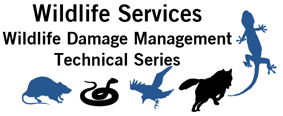United States Department of Agriculture: Animal and Plant Health Inspection Service

Wildlife Damage Management Technical Series
Date of this Version
1-2018
Document Type
Article
Citation
Miller, J.E. 2018. Wild Turkeys. Wildlife Damage Management Technical Series. USDA, APHIS, WS National Wildlife Research Center. Fort Collins, Colorado. 12p.
Abstract
Like other bird and mammal species whose populations have been restored through conservation efforts, wild turkeys (Figure 1) are treasured by many recreationists and outdoor enthusiasts. Wild turkeys have responded positively to wildlife habitat and population management. In some areas, however, their increased populations have led to increased damage to property and agricultural crops, and threats to human health and safety. Turkeys frequent agricultural fields, pastures, vineyards and orchards, as well as some urban and suburban neighborhoods. Because of this, they may cause damage or mistakenly be blamed for damage. Research has found that despite increases in turkey numbers and complaints, damage is often caused by other mammalian or bird species, not turkeys. In the instances where turkeys did cause damage, it was to specialty crops, vineyards, orchards, hay bales or silage pits during the winter. In cultured crops or gardens where wood chips, pine straw or other bedding materials (mulch) are placed around plants, wild turkeys sometimes scratch or dig up the material and damage plants when searching for food. Wild turkeys can also be aggressive towards people, especially during the breeding season.
No single management method to prevent wild turkey damage works all the time or in all settings. Generally, management methods should be combined so that one method enhances the effects of another. Because of existing regulations on the harassment or lethal removal of wild turkeys, contact a state or federal agency natural resources professional to assess the situation, confirm it is wild turkey damage, and provide damage management recommendations.
Included in
Behavior and Ethology Commons, Biodiversity Commons, Other Animal Sciences Commons, Other Ecology and Evolutionary Biology Commons, Population Biology Commons, Terrestrial and Aquatic Ecology Commons


Comments
U.S. Department of Agriculture publication.